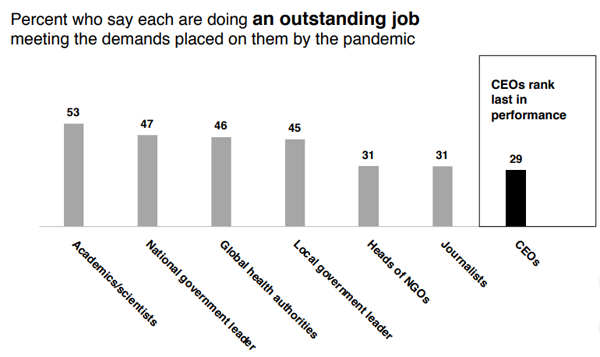
Does your company advertise? If so, I have bad news: Your audience doesn’t trust your ads.
I don’t mean to call you out specifically, dear anonymous reader. But statistically speaking, it is a likely reality. A wide-reaching survey earlier this year “found advertising to be the least likely source people would use to garner information about a business, with just 14% saying they trust advertisers in this respect.”
That’s not to say advertising doesn’t work. It just doesn’t work on its own.
Customers are looking elsewhere to form perceptions about your business and what it stands for. Only once they’ve shaped these perceptions are your ads likely to break through and make an impact. Social media is becoming more vital than ever as a proving ground for brands in this respect.
Trust and Transparency Are Rising to the Forefront
New research from Demand Gen Report reinforces a trend that’s been gaining steam for some time: trust and transparency are essential to engaging current B2B buyers. As an always-on channel where brands can broadcast their voices regularly, interact with followers, and define their viewpoints on timely topics, social media is emerging as arguably the single most critical touchpoint for cultivating an authentic, trustworthy outward image for your organization.
When it comes to nailing down your social media strategy in the current climate, there are a few things you should know.
5 Key Considerations for Building Trust on Social Media Today
Many brands are exploring features to drive direct one-on-one engagement.
This was the top trend highlighted in Hootsuite’s new look at 2020 social media trends. More than half of all respondents in the company’s survey of marketers said the rise of private social channels (i.e., in-app messaging functions and closed groups) are causing them to rethink their social strategies.
Noting that each still plays a valuable role, Hootsuite breaks the distinction down like this: “public feeds are the place to drive awareness; private channels are the place to drive meaningful one-to-one engagement.” While the majority of brand discovery still happens on those public social feeds, private channels such as members-only groups provide an opportunity to take the next step in building tight-knit communities and relationships.
As you evaluate what your social media strategy will look like going forward, it’s wise to think about how you can balance these two sides of the coin. Your peers are doing so.
Putting your purpose first is the right move.
According to Deloitte’s research, “Purpose-driven companies witness higher market share gains and grow three times faster on average than their competitors, all while achieving higher workforce and customer satisfaction.” While your employees might have a good understanding of the values that prop up your brand and drive its mission statement, this tends to be less clear to the outside world.
It’s not enough to claim to be purpose-driven. Customers want to see companies demonstrate their guiding principles with consistency and conviction. Social media provides the means for this visibility. Make sure your organization’s purpose and central values are routinely present in content shared via social. As I wrote last year, the worst stand any brand can take is standing still.
“The worst stand any brand can take is standing still.” @NickNelsonMN #SocialMediaMarketing #PurposeDriven #B2B Click To TweetCustomers are increasingly taking notice of where companies spend ad dollars.
There may be instances where adhering to your brand’s values can affect the channels you choose to be present on. Recently we saw Coca-Cola shut down its social media advertising for 30 days, as numerous other brands pull ad spend from Facebook amidst a wave of societal heat for the platform. This and other developments will be worth keeping a close eye on.
The bottom line: People need to trust the environment where they encounter your message in order to trust the message itself.
Right now, there’s a thin line between relevance and redundancy.
Consumers were already tired of COVID-19-related ads in April. By now I think it’s safe to say almost everyone is eager to hear about other topics. Yet, as the pandemic rages on here in America, it’s nigh impossible to talk about anything without at least addressing the elephant in the room, lest you appear out of touch.
This is a challenge that will test the mettle of even the most seasoned marketers. How can you stay acutely relevant and useful to your audience without contributing to coronavirus content fatigue? How can you speak out on key societal issues without coming off as overbearing? How can you address the uncertainty your customers face without falling back on the triteness of “these uncertain times”?
In this moment, it’s more critical than ever to have open conversations with your followers and pay close attention to engagement signals.
People want to see leadership from company executives.
One momentous opportunity for brands on social media is to showcase the thought leadership — and leadership of all kinds, really — from executives. Data suggests this is an area needing improvement. The 2020 Edelman Trust Barometer Spring Update found that the public is generally unimpressed by the way CEOs are stepping up in the face of COVID-19, with just 29% of survey respondents saying this cohort is “doing an outstanding job meeting the demands placed on them by the pandemic.”
Ultimately, trusting relationships aren’t built with brands, but rather with the human beings behind those brands. Attaching a face and voice to your content can drastically magnify the impact and relatability of that content. Encourage your CEO and other company leaders to become visible and vocal through your social accounts.
According to @EdelmanPR research, only 29% of people feel CEOs are doing an outstanding job of meetings the demands placed on them by #COVID19. #CrisisMarketing Click To TweetRise Above and Earn Trust
We are living in a unique time, which yields unique challenges and opportunities. Many social networks have reported heightened usage, but users are also scrutinizing brand messages and veracity of information more than ever.
To ensure you’re staying on the right course, I recommend:
- Finding the right balance between broader awareness efforts and more focused relationship-building tactics, by taking advantage of emerging one-on-one engagement capabilities.
- Putting your brand’s purpose at the center of your social media content strategy.
- Being thoughtful about which platforms, partners and influencers you associate with, and how they are viewed by your audience.
- Staying relevant to the timely needs and concerns of your followers, while avoiding an overemphasis on topics they are fatigued by.
- Showcasing the voices and thought leadership of your company’s front-facing executives.
As Paul Gillin once said, “Transparency may be the most disruptive and far-reaching innovation to come out of social media.” During a time of pervasive disruption throughout the business world, this innovative transparency is more valuable than ever when it comes to that essential edict of building trust. And when a sturdy foundation of trust is established, the rest of your strategic digital marketing mix — from blogs to webinars to ads and beyond — will become all the more effective.
For more tips on stepping up your brand’s social media game, check out Josh Nite’s recent post featuring 5 Ways to Make Brand Social Media Profiles More Compelling.





